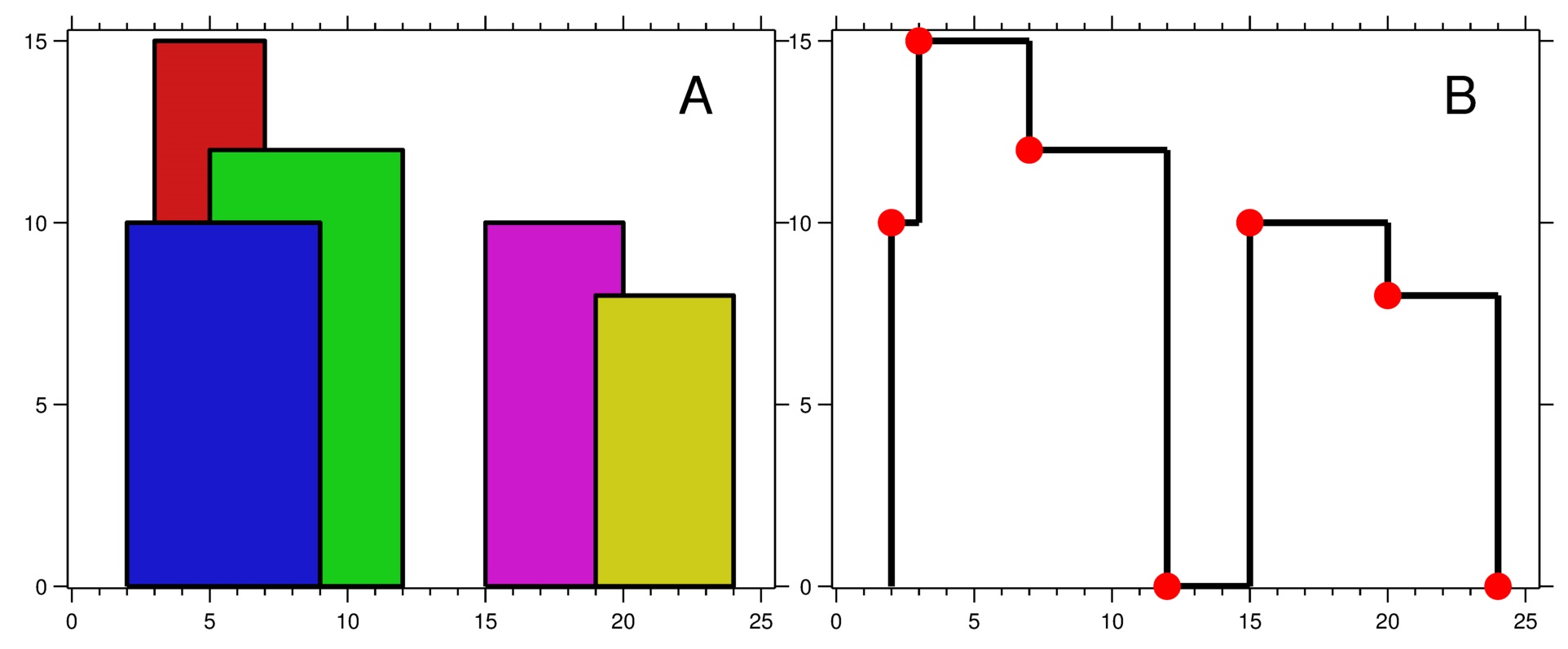動機
被這題搞了兩天,所以要記錄下來 以前沒有看線段合併的Divide and Conquer,所以要記錄下來 (還債) 以前沒有看Segment tree,所以要記錄下來 (還債)
Problem
A city's skyline is the outer contour of the silhouette formed by all the buildings in that city when viewed from a distance. Given the locations and heights of all the buildings, return the skyline formed by these buildings collectively.
The geometric information of each building is given in the array buildings where buildings[i] = [lefti, righti, heighti]:
leftiis the x coordinate of the left edge of theithbuilding.rightiis the x coordinate of the right edge of theithbuilding.heightiis the height of theithbuilding.
You may assume all buildings are perfect rectangles grounded on an absolutely flat surface at height 0.
The skyline should be represented as a list of key points sorted by their x-coordinate in the form [[x1,y1],[x2,y2],...]. Each key point is the left endpoint of some horizontal segment in the skyline except the last point in the list, which always has a y-coordinate 0 and is used to mark the skyline's termination where the rightmost building ends. Any ground between the leftmost and rightmost buildings should be part of the skyline's contour.
Note: There must be no consecutive horizontal lines of equal height in the output skyline. For instance, [...,[2 3],[4 5],[7 5],[11 5],[12 7],...] is not acceptable; the three lines of height 5 should be merged into one in the final output as such: [...,[2 3],[4 5],[12 7],...]
Example 1:

Input: buildings = [[2,9,10],[3,7,15],[5,12,12],[15,20,10],[19,24,8]]Output: [[2,10],[3,15],[7,12],[12,0],[15,10],[20,8],[24,0]]Explanation:Figure A shows the buildings of the input.Figure B shows the skyline formed by those buildings. The red points in figure B represent the key points in the output list.
Example 2:
Input: buildings = [[0,2,3],[2,5,3]]Output: [[0,3],[5,0]]
Constraints:
1 <= buildings.length <= 1040 <= lefti < righti <= 231 - 11 <= heighti <= 231 - 1buildingsis sorted byleftiin non-decreasing order.
Ver1: Stack (many WA)
def retAppend(ret,p):
#if not ret or ret[-1][1] != p[1]:
ret.append(p)
def fg(stk,ret,b): # (stk,b) -> stk,ret
print(b)
print(ret,stk)
if not stk:
retAppend(ret,[b[0],b[2]]) # raise
stk.append(b)
return [stk,ret]
else:
now = stk[-1]
if b[0] == now[0] and b[1] == now[1]: # same seg
if b[2] > now[2]:
stk.pop()
stk.append(b)
return [stk,ret]
else:
return [stk,ret]
elif b[0] < now[1] and b[1] <= now[1]: # whole seg in roof
if b[2] > now[2]:
retAppend(ret,[b[0],b[2]]) # raise
a = stk.pop()
stk.append([b[1],a[1],a[2]])
stk.append(b)
return [stk,ret]
else:
return [stk,ret]
elif b[0] < now[1] and now[1] < b[1]: # part of seg in roof
if b[2] > now[2]:
retAppend(ret,[b[0],b[2]])
stk.pop()
stk.append(b)
return [stk,ret]
elif b[2] == now[2]:
tmp = stk.pop()
stk.append([tmp[0],b[1],b[2]])
return [stk,ret]
else:
tmp = stk.pop()
a = [tmp[1],b[1],b[2]]
return fg(stk,ret,a)
elif b[0] == now[1]: # touch
print(now,b,[now[1],now[2]])
if b[2] > now[2]:
retAppend(ret,[b[0],b[2]]) # raise
elif b[2] < now[2]:
retAppend(ret,[now[1],b[2]]) # fall
stk.pop()
stk.append(b)
return [stk,ret]
else: # seperate
tmp = stk.pop()
retAppend(ret,[tmp[1],0 if not stk else stk[-1][2]]) # fall
return fg(stk,ret,b)
class Solution:
def getSkyline(self, bs: List[List[int]]) -> List[List[int]]:
if not bs:
return []
stk = []
ret = []
bs.sort(key=lambda b: (b[0],-b[2],b[1]))
#print(bs)
for b in bs:
stk, ret = fg(stk,ret,b)
retAppend(ret,[stk[-1][1],0])
return ret
Ver2: Divide and Conquer (AC)
def div(bs,i,j):
if i == j:
return [[bs[i][0],bs[i][2]], [bs[i][1],0]]
else:
mid = (j+i)//2
return merge(div(bs,i,mid), div(bs,mid+1,j))
def merge(a,b):
ret = []
i = 0
j = 0
h = 0
h1 = 0
h2 = 0
while i < len(a) or j < len(b):
if i < len(a) and j < len(b):
cur = None
if a[i][0] < b[j][0]:
cur = a[i][0]
h1 = a[i][1]
i+=1
elif a[i][0] > b[j][0]:
cur = b[j][0]
h2 = b[j][1]
j+=1
else:
cur = b[j][0]
h1 = a[i][1]
h2 = b[j][1]
i += 1
j += 1
h = max(h1,h2)
if not ret or ret[-1][1] != h:
ret.append([cur, h])
elif i < len(a):
ret += a[i:]
break
else:
ret += b[j:]
break
return ret
class Solution:
def getSkyline(self, bs: List[List[int]]) -> List[List[int]]:
if not bs:
return []
else:
return div(bs,0,len(bs)-1)
Ver3: heap & Sweep Line (AC)
from heapq import *
def f(poses):
hq = []
ret = []
for p in poses:
if not hq or p[1] < 0: # start seg
heappush(hq,p[1])
else: # end seg
hq.pop(hq.index(-p[1]))
heapify(hq)
if not hq:
ret.append([p[0],0])
else:
if not ret:
ret.append([p[0],-hq[0]])
else:
if ret[-1][0] == p[0] and p[1] < 0: # tete
if ret[-1][1] < -p[1]:
ret[-1][1] = -p[1]
else:
if ret[-1][1] != -hq[0]: # height changed
ret.append([p[0],-hq[0]])
else:
pass
return ret
class Solution:
def getSkyline(self, bs: List[List[int]]) -> List[List[int]]:
if not bs:
return []
else:
poses = []
for b in bs:
poses.append([b[0],-b[2]])
poses.append([b[1],b[2]])
poses.sort(key= lambda p: (p[0],p[1]))
return f(poses)
from sortedcontainers import SortedList
def f(poses):
hq = SortedList()
ret = []
for p in poses:
if not hq or p[1] < 0: # start seg
hq.add(p[1])
else: # end seg
del hq[hq.bisect_left(-p[1])]
if not hq:
ret.append([p[0],0])
else:
if not ret:
ret.append([p[0],-hq[0]])
else:
if ret[-1][0] == p[0] and p[1] < 0: # tete
if ret[-1][1] < -p[1]:
ret[-1][1] = -p[1]
else:
if ret[-1][1] != -hq[0]: # height changed
ret.append([p[0],-hq[0]])
else:
pass
return ret
class Solution:
def getSkyline(self, bs: List[List[int]]) -> List[List[int]]:
if not bs:
return []
else:
poses = []
for b in bs:
poses.append([b[0],-b[2]])
poses.append([b[1],b[2]])
poses.sort(key= lambda p: (p[0],p[1]))
return f(poses)